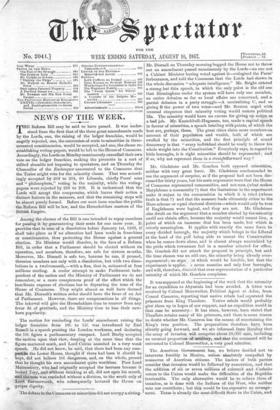Mr. Gladstone and Mr. Goschen both opposed minorities, neither with
very great force. Mr. Gladstone condescended to use the argument of surprise, as if the proposal had not been dis- cussed for thirty years, but his main arguments were that the House of Commons represented communities, and not men (what makes Marylebone a community?) that the limitations in the experiment make it unjust to the communities in which it is tried (whose fault is that ?) and that the measure leads ultimately either to the Hare scheme or equal electoral districts—which would only be true if Englishmen were logical, and they are not. Mr. Gladstone also dwelt on the argument that a member elected by the minority could not obtain office, because the majority would unseat him, a point of which an immense deal has been made; but which is utterly meaningless. It applies with exactly the same force to every divided borough, the majority which brings in the Liberal at the head of the poll being able to unseat the Conservative when he comes down alone, and is almost always neutralized by the pride which townsmen feel in a member selected for office. Mr. Goschen did not attack the proposal in principle, but said the time chosen was an odd one, the minority being already over- represented ; an argil. at which would be forcible, but that the experiment is appliec. J seven counties and only four boroughs, and will, therefore, diminish that over-representation of a particular minority of which Mr. Goschen complains:






























